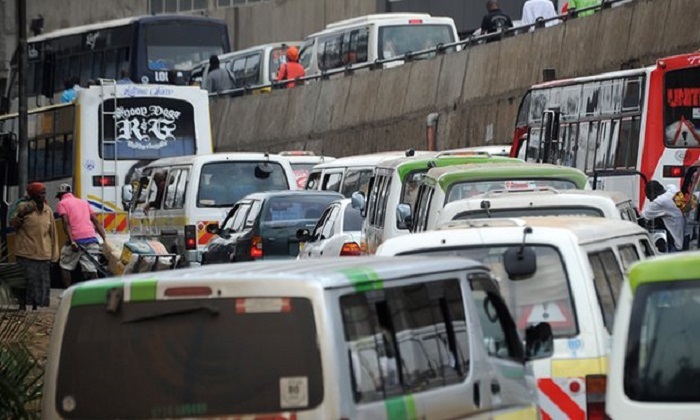While most major environmental hazards have been improving with development gains and industrialisation, outdoor (or “ambient particulate”) air pollution from traffic, power generation and industries is increasing rapidly, especially in fast-developing countries such as Egypt, South Africa, Ethiopia and Nigeria.
“Annual deaths from ambient [outdoor] particulate matter pollution across the African continent increased by 36% from 1990 to 2013. Over the same period, deaths from household air pollution also continued to increase, but only by 18%”, said a researcher at the Paris-based Organisation for Economic Co-operation and Development development centre. The OECD is funded by the world’s richest 34 countries.
For Africa as a whole, the estimated economic cost of premature air pollution deaths in 2013 was roughly $215bn (£175bn) a year for outdoor air pollution, and $232bn for household, or indoor, air pollution.
The study’s author, Rana Roy, is concerned by the pace at which outdoor air pollution is growing in Africa, bucking the downward trend in most countries. Used cars and trucks imported from rich countries are adding to urban pollution caused by household cooking on open fires.
“This mega-trend is set to continue to unfold throughout this century. It suggests that current means of transportation and energy generation in African cities are not sustainable,” said Roy. “Alternative models to those imported from industrialised economies, such as dependence on the individual automobile, are necessary.
“It is striking that air pollution costs in Africa are rising in spite of slow industrialisation, and even de-industrialisation in many countries. Should this latter trend successfully be reversed, the air pollution challenge would worsen faster, unless radically new approaches and technologies were put to use.
“The ‘new’ problem of outdoor air pollution is too large to be ignored or deferred to tomorrow’s agenda. At the same time, Africa cannot afford to ignore the ‘old’ problem of household pollution or to consider it largely solved: it is only a few high-income countries – Algeria, Egypt, Libya, Mauritius, Morocco, Seychelles and Tunisia – that can afford to view the problem of air pollution as being a problem of outdoor particulate pollution alone.”
The study stresses that there is not nearly enough knowledge of the sources of air pollution and its impact in much of Africa. It quotes UK scientist Mathew Evans, professor of atmospheric chemistry at York University, who is leading a large-scale investigation of air pollution in west Africa.
“London and Lagos have entirely different air quality problems. In cities such as London, it’s mainly due to the burning of hydrocarbons for transport. African pollution isn’t like that. There is the burning of rubbish, cooking indoors with inefficient fuel stoves, millions of steel diesel electricity generators, cars which have had the catalytic converters removed and petrochemical plants, all pushing pollutants into the air over the cities. Compounds such as sulphur dioxide, benzene and carbon monoxide, that haven’t been issues in western cities for decades, may be a significant problem in African cities. We simply don’t know.”
Whereas China has reached a level of development that has allowed it to concentrate on solving air pollution, most African countries must grapple with several major environmental burdens at the same time, said the report.
“[They] are not in the position of a China, which can today focus on air pollution undistracted by problems such as unsafe water or unsafe sanitation or childhood underweight,” said Roy.
Henri-Bernard Solignac-Lecomte, head of the Europe, Middle east and Africa unit at the OECD development centre, said the paper made a double case for action. “Air pollution in Africa increasingly hurts people and hinders economic development. Reducing it requires urgent action by governments to change the unsustainable course of urbanisation. Indeed, Africa urbanises at a very fast pace: today’s 472 million urban dwellers will be around a billion in 2050. Today’s investment choices will have decade-long impacts on urban infrastructure and the quality of life of urbanites.
“Bold action to improve access to electricity, using clean technologies such as solar power, can contribute to reducing the exposure of the poorer families to indoor smog from coal or dung-fired cooking stoves.
“As for outdoor pollution, African economies would be well advised to learn from the experience of industrialised countries, for example by developing mass public transportation systems – like Rabat or Addis-Ababa are doing with their tramways.”
Roy warned that the human and economic costs of air pollution might “explode” without bold policy changes in Africa’s urbanisation policies.
She concluded with a call for urgent international action: “If Africa’s local air pollution is contributing to climate change today, at a time when its population stands at 1.2 billion, or 16% of the world’s population, it is safe to suppose that … it is likely to contribute considerably more when its population increases to around 2.5 billion, or 25% of the world’s population in 2050, and thence to around 4.4 billion, or 40% of the world’s population in 2100.”
More about:
















































